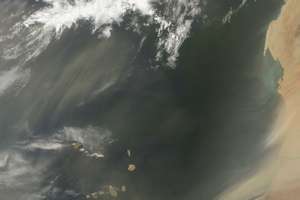Researchers target West African climate predictions

An international team of scientists have begun a major investigation into the complex meteorology of West Africa including how rapidly increasing air pollution is affecting the monsoon.
The €9 million EU-funded project, involving 16 organisations from six countries, aims to develop new models to enable better weather predictions and longer-term climate projections for the region.
The researchers will investigate the whole chain from the impact of natural and manmade emissions to impacts on climate, ecosystems and health.
"Southern West Africa has witnessed the largest population increase globally in recent years, characterised by massive urbanisation along the coast and agricultural areas immediately following inland," said Professor Hugh Coe, who leads one of the teams within The University of Manchester's School of Earth, Atmospheric and Environmental Sciences.
"An explosive increase in anthropogenic emissions in the cities from the burning of fossil fuels and biomass, as well as natural emissions from plants, can lead to the formation of solid and liquid aerosol particles. "These can serve as condensation nuclei and change how clouds behave, affecting rainfall and surface heating – a potential regional climate factor largely unquantified. In addition, the massive conversion of natural forests into agricultural land also affects the climate locally.
"The increase of fine particles in the atmosphere has led to a surge of respiratory diseases in the cities, while high ozone concentrations are more typical for areas downstream and affect the health of the rural population as well as agricultural production and food security."
According to a recent World Bank report, West Africa is one of the regions forecast to suffer most under the impacts of global climate change.
"We suspect that the enhanced cloudiness could impact on the entire monsoon system," said Professor Peter Knippertz of the Institute for Meteorology and Climate Research at the Karlsruhe Institute of Technology (KIT). "Changes in West Africa can impact remote regions – we know for example that the West Africa monsoon interacts with the Indian monsoon and that it influences Atlantic hurricane activity. The lessons learned from this research will be transferable to other monsoon regions and support policymaking in the development sector."
Professor Knippertz is coordinating the project, known as DACCIWA (Dynamics-aerosol-chemistry-cloud interactions in West Africa, which will run for 4.5 years.
Provided by University of Manchester


















